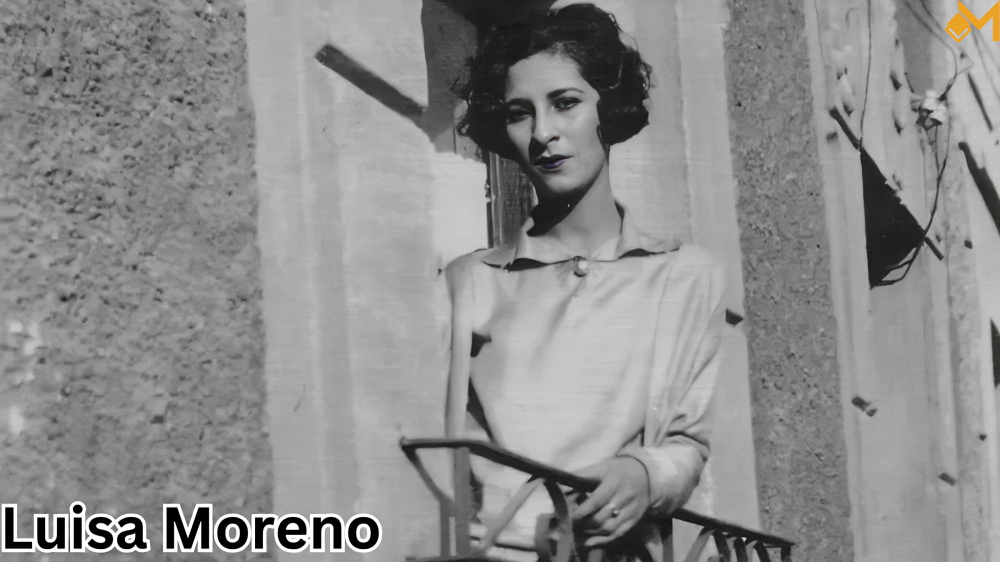Luisa Moreno, born Blanca Rosa López Rodríguez in Guatemala in 1907, was a pioneering activist whose work laid the groundwork for both the labor rights and civil rights movements in the United States during the early to mid-20th century. Her contributions to the labor movement, particularly for Latino and immigrant workers, as well as her fight for social justice, have left a lasting impact that still resonates today. Despite her significant achievements, her story is not as widely known as those of other civil rights figures. This article explores her life, career, and legacy in-depth, shedding light on her contributions and the lasting relevance of her work.
Early Life and Education in Guatemala
Luisa Moreno was born into a middle-class family in Guatemala City. Her father, a newspaper editor, and her mother, a schoolteacher, emphasized education and civic responsibility, which greatly influenced her later activism. She attended private schools in Guatemala and encountered a wide variety of ideas, ranging from liberalism to socialism.
As a young woman, she grew disillusioned with the rigid social hierarchies in Guatemalan society, particularly the stark divide between the wealthy elite and the impoverished working class. This growing awareness of social inequality ignited her passion for justice and set the stage for her future work as an activist. In 1925, at the age of 19, she moved to Mexico, where she became involved in the intellectual and artistic circles that were advocating for social reform.
Her exposure to revolutionary ideas in Mexico deepened her understanding of class struggles, labor rights, and feminism. By the time she relocated to the United States in 1928, she was ready to take an active role in the labor and civil rights movements that would define the rest of her life.
Early Activism in the United States
After arriving in New York City in 1928, Moreno worked as a seamstress in a garment factory, where she experienced firsthand the harsh working conditions that many immigrant women faced. Low wages, long hours, and unsafe working environments were the norm, and many of the workers were non-English-speaking immigrants who had little understanding of their rights.
During this time, Moreno became involved with labor unions and the growing labor movement. She quickly rose through the ranks of union leadership, advocating for the rights of women and minority workers. Her activism in New York became the first step in what would be a lifelong commitment to workers’ rights and social justice.
By the 1930s, Moreno actively participated in the Congress of Industrial Organizations (CIO), where she organized Latino and African American workers, whom other labor movements largely ignored. Her ability to speak both English and Spanish made her particularly effective in mobilizing immigrant workers, especially in industries that employed large numbers of Latino workers.
Founding El Congreso
One of Moreno’s most notable achievements came in 1939 when she helped establish El Congreso de Pueblos que Hablan Español (The Congress of Spanish-Speaking Peoples), the first national Latino civil rights assembly in the United States. The organization aimed to unite Spanish-speaking workers across industries, states, and social groups, advocating for labor rights, civil liberties, and an end to racial discrimination.
Under her leadership, El Congreso took on many of the issues affecting Latino communities, such as police brutality, segregation, and voter suppression. It also advocated for better wages and working conditions for Latino workers, especially in agriculture and manufacturing sectors, where exploitation was rampant.
El Congreso was groundbreaking not only because it addressed issues affecting Latino communities but also because it was inclusive of women and immigrant workers. Moreno believed that true social justice could only be achieved by giving the most marginalized members of society a voice.
Advocacy for Women Workers
Moreno’s advocacy for women’s rights, particularly for immigrant and minority women, was a key component of her activism. She recognized that women workers, especially Latina and African American women, faced unique challenges in the workforce. They often faced discrimination based on both their gender and their race or ethnicity.
Through her work with labor unions and El Congreso, Moreno fought for equal pay, better working conditions, and maternity leave for women workers. She also organized workshops and conferences to educate women about their rights and how to advocate for themselves in the workplace.
One of her most notable achievements was organizing strikes among Latina women workers in the canning and garment industries. These strikes played a pivotal role in winning better wages and working conditions for the workers, many of whom faced egregious exploitation by their employers.
Collaboration with Other Activists
Throughout her career, Moreno worked alongside many prominent labor and civil rights leaders, including Emma Tenayuca, a Mexican-American labor organizer, and Dolores Huerta, who would later co-found the United Farm Workers with César Chávez. Moreno collaborated not only with Latino activists but also with African American and Asian American labor leaders, recognizing the interconnectedness of their struggles.
Her cross-racial solidarity set her apart from many other activists of the time, who often focused solely on the rights of their own ethnic or racial group. Moreno believed that the fight for labor rights and civil rights was universal and that unity among marginalized communities was essential for achieving justice.
World War II and the Zoot Suit Riots
During World War II, the Latino population in the United States, particularly in California, grew significantly as more immigrants came to work in agriculture and industry to support the war effort. However, this increase in the Latino population also led to heightened racial tensions, particularly in Los Angeles.
In 1943, the Zoot Suit Riots erupted in Los Angeles, where white servicemen attacked Mexican-American youths, many of whom wore distinctive zoot suits. These racially motivated attacks highlighted the deep-seated racial prejudices in American society. Moreno, through El Congreso and her connections with labor unions, was vocal in her condemnation of the attacks and the subsequent police inaction. She helped organize protests and rallies to raise awareness about the racial injustices faced by Latino communities.
Deportation and Exile
Despite her tireless work for labor rights and civil rights, Moreno became a target of the U.S. government during the Red Scare of the late 1940s and early 1950s. Her involvement with left-leaning organizations and her advocacy for immigrant workers drew the attention of the House Un-American Activities Committee (HUAC), which investigated suspected Communist activities.
In 1950, Moreno was accused of being a Communist sympathizer, although there was little evidence to support this claim. Nevertheless, the government used her political beliefs and immigrant status against her, forcing her to leave the United States under the threat of deportation. She returned to Guatemala, where she continued her advocacy for social justice.
While in Guatemala, Moreno remained active in labor rights and civil rights issues, though she was unable to achieve the same level of influence she had in the United States. She lived in relative obscurity for the remainder of her life and passed away in 1992. Despite her exile, her contributions to the labor and civil rights movements in the United States remain a vital part of American history.
Legacy and Impact
Luisa Moreno’s legacy is one of perseverance, courage, and an unwavering commitment to justice. Her work laid the groundwork for future generations of labor activists and civil rights leaders, particularly within the Latino community. Her ability to unite workers across racial and ethnic lines was groundbreaking and set a precedent for future labor movements.
Moreno’s advocacy for immigrant rights, women’s rights, and labor rights helped shift the narrative about what it meant to be a worker in the United States. She pushed for the recognition of immigrant and minority workers as integral parts of the American workforce and as deserving of the same rights and protections as other workers.
Contributions to Labor Rights
Moreno’s work with labor unions and El Congreso brought much-needed attention to the exploitation of Latino workers in the agricultural and manufacturing sectors. Her efforts to organize strikes and advocate for better working conditions helped improve the lives of thousands of workers, many of whom had been subjected to harsh and unsafe working environments.
Her focus on women workers, in particular, was ahead of its time. Moreno recognized the unique challenges that women faced in the workforce and fought for their rights, long before the feminist movement of the 1960s and 1970s brought these issues to the forefront of national consciousness.
Influence on Civil Rights
Moreno’s contributions to the civil rights movement are equally significant. Through her work with El Congreso, she advocated for an end to racial discrimination and police brutality against Latino communities. Her efforts to unite marginalized groups across racial and ethnic lines set the stage for future civil rights movements, including the Chicano Movement of the 1960s and 1970s.
Although she was exiled from the United States, her influence on the labor and civil rights movements did not fade. Leaders like Dolores Huerta and César Chávez, who worked to organize farmworkers in the 1960s, drew inspiration from Moreno’s work and built upon the foundation she helped establish.
Recognition and Honors
In recent years, there has been a growing recognition of Moreno’s contributions to American history. Schools, community centers, and labor organizations have honored her legacy through awards, scholarships, and educational programs. Her life’s work has been featured in documentaries and books, helping to raise awareness about her contributions to labor rights and civil rights.
In 2019, Moreno was posthumously inducted into the California Hall of Fame, a testament to the lasting impact of her work. Despite the challenges she faced and the obstacles put in her way, Luisa Moreno’s legacy continues to inspire activists, workers, and advocates for justice today.
FAQs
1. Who was Luisa Moreno?
Luisa Moreno was a Guatemalan-born labor leader, civil rights activist, and advocate for Latino and immigrant workers in the United States. She played a key role in organizing labor unions and co-founded El Congreso de Pueblos que Hablan Español, the first national Latino civil rights organization in the U.S.
2. What did Luisa Moreno accomplish in the labor movement?
Moreno fought for better wages and working conditions for Latino, immigrant, and women workers. She organized strikes in industries such as canning and garment factories and worked with the Congress of Industrial Organizations (CIO) to bring attention to the exploitation of these workers.
3. What is El Congreso de Pueblos que Hablan Español?
El Congreso, co-founded by Luisa Moreno in 1939, was the first national organization to advocate for the rights of Spanish-speaking people in the United States. It addressed labor issues, civil rights, voter suppression, and police brutality against Latino communities.
4. Why was Luisa Moreno deported?
During the Red Scare in the 1950s, Luisa Moreno was targeted for her left-leaning political views and labor activism. She was forced to leave the U.S. under threat of deportation due to her alleged association with communist organizations, despite little evidence.
5. What is Luisa Moreno’s legacy?
Luisa Moreno’s legacy lies in her contributions to labor rights, women’s rights, and the Latino civil rights movement. Her pioneering work helped pave the way for future generations of activists, and her dedication to social justice remains a source of inspiration.
Conclusion
Luisa Moreno was a trailblazer whose work as a labor organizer and civil rights advocate has had a profound impact on American society. Her efforts to unite workers across racial and ethnic lines, advocate for women’s rights, and challenge the exploitation of immigrant laborers laid the groundwork for future movements for social justice.
Though her life was marked by challenges, including her forced exile from the United States, Moreno’s legacy remains one of resilience and courage. Her story serves as a reminder of the importance of fighting for justice, even in the face of adversity, and her contributions continue to inspire those working for a more equitable society today.
Sign up for our Daily newsletter
We'll be in your inbox every morning Monday-Saturday with all the day’s top business news, inspiring stories, best advice and reporting from Entrepreneur,


